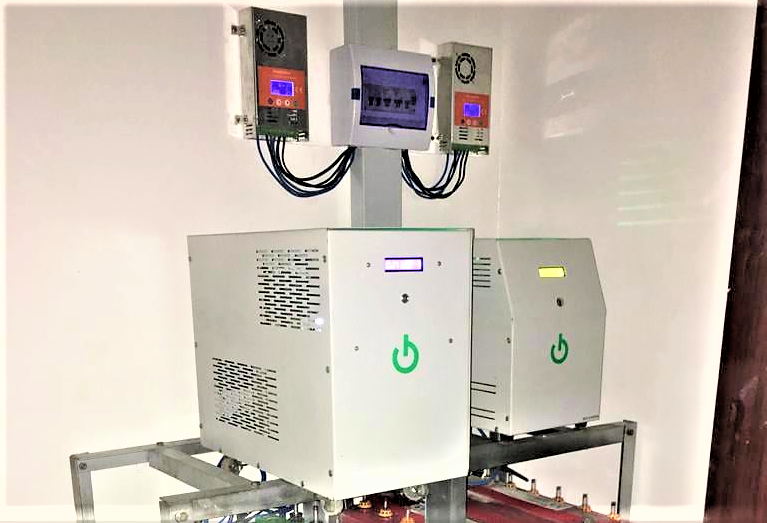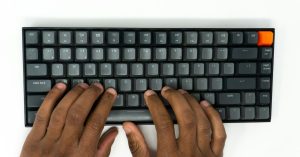Founded by 5 students in 2017, this renewable energy company in southeastern Nigeria makes solar inverters and charge controllers from locally-sourced materials (except for semiconductors). But the firm is not stopping there: eventually, Greenage Technologies wants to produce batteries for solar units.
On June 16 this year, Greenage received a $450,000 boost from All-On, a Shell-funded impact investment company, to enable it expand its manufacturing capabilities to meet growing demand. The funding, a mix of equity and convertible debt, comes 3 years after Greenage emerged as a winner in the USADF’s 2018 renewable energy competition. All-On’s earlier convertible debt is part of this new financing round, bringing the total to $500,000. Earlier in the firm’s journey, they had received early cheques from Genesys Tech Hub and Nigeria’s South South/South East Angel Network (SSE Angel Network).
Outgoing All-On CEO, Wiebe Boer, said All-On’s latest investment in Greenage Technologies will help lower the number of solar components imported into Nigeria.
The story of Greenage Technologies begins at the end of a church meeting in 2012. After the meeting, a member of the church invited Aaron Esumeh who had just gotten into the University of Nigeria, Nsukka to study electrical and electronics engineering, to his workshop. The man offered to teach Esumeh how to make simple electronic devices. Esumeh obliged and then persuaded his roommate, Okereke Kingsley, to join him. Both students and three others (Nwangele Chukwuemeka, Udeh Nnaemeka and Ogechukwu Emmanuel) then founded Greenage Technologies in 2017.
The first product they manufactured took the young engineers to the police station. A customer got them arrested because the device failed to meet his expectations. But the students were undeterred.
“We saw that there was this basic problem Nigeria had,” Esumeh, one of the co-founders and now chief executive of Greenage Technologies, told TechCabal on a call. “[It was that] whenever we see an opportunity, we do not maximise the full value chain.”
Esumeh remarked that at the time, “Solar was becoming a big deal, everyone was seeing it as a potential alternative and we’re still about to make the same mistake…of importing everything and not maximising the value chain.”
The young engineers decided that they would not settle for simply installing solar systems. They would make the inverters and charge controllers themselves.
In November 2016, the Enugu state governor purchased one of Greenage’s early inverter prototypes during the first Nsukka Trade Fair. The purchase boosted their confidence, Esumeh said. The next year, the founders moved into a university workshop where they spent time researching and refining their prototype. After the 5 co-founders graduated from the University of Nigeria, Nuskka in 2018, they moved their operations to a bigger workshop in Enugu, a city in southeastern Nigeria.
In 2018, Greenage participated in the joint US African Development Foundation (USADF) All-On organised Off-Grid Challenge and emerged winner alongside 9 other firms. For winning the competition, Greenage received $100,000 ($50,000 as a grant from USADF and $50,000 in convertible debt).
Making renewable energy local
More entrepreneurs are setting up renewable energy solutions that target the energy-starved African consumer. But everything from solar panels to inverters, batteries, and charge controllers are usually imported from abroad, slapped with superficial branding, and sold to users. On the other hand, the market for installers is growing with companies and sometimes lone mechanics that only install the units.
“It is important for Africa to develop and maintain independent energy policies that both preserve the environment and supports the economy. Making our energy here, and with locally-sourced materials is a vital step towards building a robust, resilient clean energy-driven economy.”
“People didn’t believe what was made in Nigeria. So we had to find a way to prove to them that this thing works. And the best way we decided to prove it is that we had to take it to market ourselves,” Esumeh told TechCabal. “So anytime someone says I need solar in my house, we insisted that if we were to install it for you, you must use our products.” According to Esumeh, some of their distributors rebrand their products with “Made in Taiwan” notes so customers (who may otherwise not purchase a made-in-Nigeria product) would be none the wiser. This underscores a prevailing belief that locally manufactured products, especially are subpar.
Because Greenage had used previous investments to standardise and automate their production line, eliminate human error, and improve the finishing of their inverters and charge controllers, it is easy to mistake the well-finished products for imported goods. Esumeh’s company currently makes inverters of between 300 watts to 3OkVA capacity. He adds that, eventually, his company will begin another ambitious program—producing lithium-ion batteries.
At any rate, Greenage is now one of the handful of older firms like Ghana’s Sustainable Power Solutions (SPS), that want to change how renewable energy in Africa is developed by making clean energy for Africa, in Africa. SPS, self-described as the only solar panel maker in Africa, manufactures solar units at its factory in Kpone near Tema in the Greater Accra region.
As conversation and policies about clean energy continue to grow, it is important for Africa to develop and maintain independent energy policies that both preserve the environment and support the economy. Making our energy here, and with locally-sourced materials, is a vital step towards building a robust, resilient clean energy-driven economy.



















